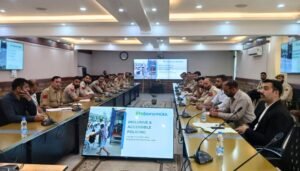
Back to Our Work
Supreme Court Decision Champions Inclusion in Medical Education

In a landmark judgment that reinforces the rights of persons with disabilities, the Supreme Court of India has quashed the National Medical Commission’s (NMC) long-standing eligibility criterion that required medical aspirants to have “both hands intact.” The decision in Anmol v. Union of India is a win for inclusive education.
Anmol’s Journey
At iProbono India, we support persons with disabilities and their guardians by pursuing interventions that ensure justice and access to equitable rights.
This commitment was the reason why we supported Anmol, a 23-year-old aspiring medical student. Born with multiple disabilities—including the loss of two fingers in both hands and significant speech difficulties—Anmol was declared ineligible for admission to any medical college by the Disability Assessment Board (DAB) in 2023, and his appeal before the Rajasthan High Court was dismissed. The following year, the DAB once again declared him ineligible, and his subsequent appeal to the Punjab and Haryana High Court met the same fate.
Anmol was referred to us by Mission Accessibility, an NGO dedicated to advancing the rights of individuals with disabilities. His case demonstrated the urgent need for reform in the assessment of disabilities. Recognising this, our team, alongside our panel advocates Atif Inam and Rishit Vimadalal, moved the Supreme Court.
A Pivotal Legal Intervention
In response to our plea, the Supreme Court directed the All India Institute for Medical Sciences (AIIMS) to establish an expert committee to assess whether Anmol’s disabilities would impede his ability to pursue an undergraduate medical education i.e., an MBBS course. The Court further recommended the inclusion of Dr. Satendra Singh—a renowned disability rights activist and physician with a disability—on the panel.
While the committee, strictly adhering to the existing NMC guidelines, found Anmol ineligible, Dr. Singh’s detailed evaluation presented a contrasting view. His dissenting report argued that with appropriate clinical accommodations and assistive technologies, Anmol is capable of completing his MBBS degree and practicing as a doctor. In light of this expert opinion, the Supreme Court passed an order to create a special seat for Anmol at a medical college near his home.
The Court’s order to form an expert committee which included a doctor with a disability, sets a transformative precedent for future cases, ensuring that medical education becomes more inclusive. The judgment stresses that there is no “one size fits all” approach when assessing the functional abilities of medical aspirants. It mandates that competence be evaluated on a case-by-case basis, with due provision for necessary clinical accommodations. This progressive stance aligns with Article 41 of the Constitution, the United Nations Convention on the Rights of Persons with Disabilities and the Rights of Persons with Disabilities (RPwD) Act—ensuring every candidate is given a fair chance to excel.
A Life Transformed
Today, Anmol is pursuing his dream of becoming a doctor—a victory that stands as a testament to the power of resilient advocacy and strategic legal intervention.
“उनके वकीलों ने बहुत सहयोग और सहायता प्रदान की। उनके सहयोग से हमने केस जीता और मुझे गवर्नमेंट मेडिकल कॉलेज, सिरोही में दाखिला मिला। धन्यवाद आईप्रोबोनो इंडिया।”
“Their lawyers were cooperative and supportive. They helped me, and with their help we won the case and I got admission at the Government Medical College, Sirohi. Thanks iProbono India.”– Anmol
His admission to the Government Medical College, Sirohi, not only transformed his life but also serves as a powerful symbol of hope for medical aspirants with disabilities nationwide.
You can read the judgment here.











